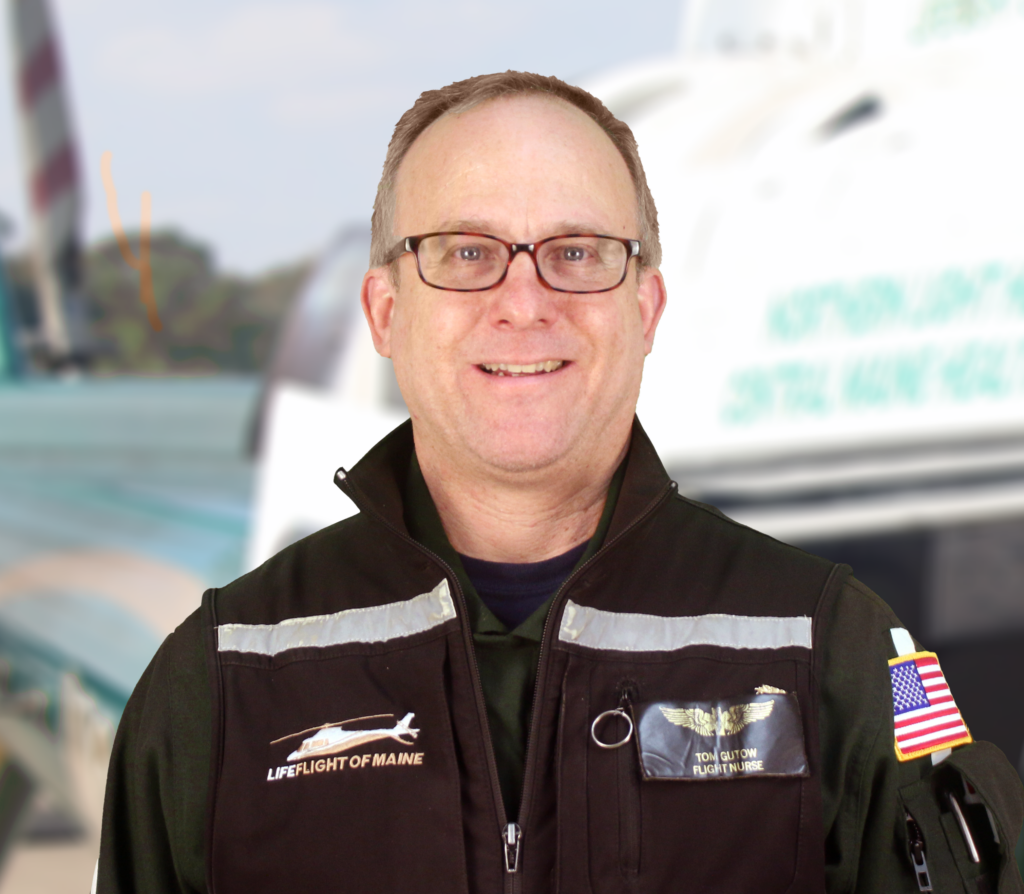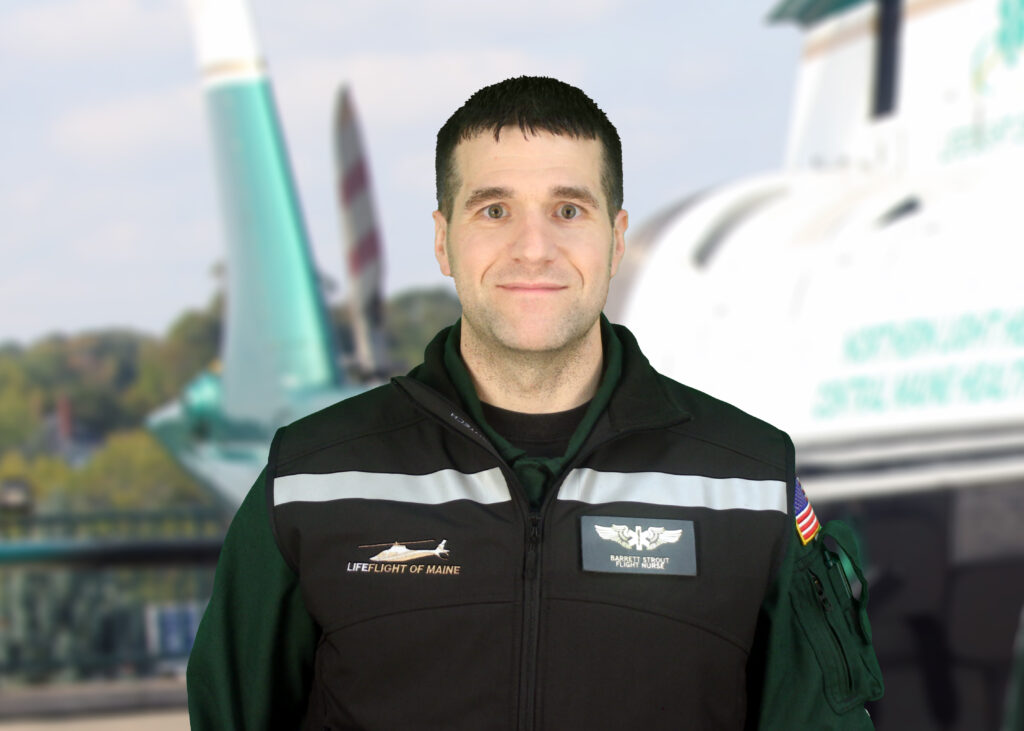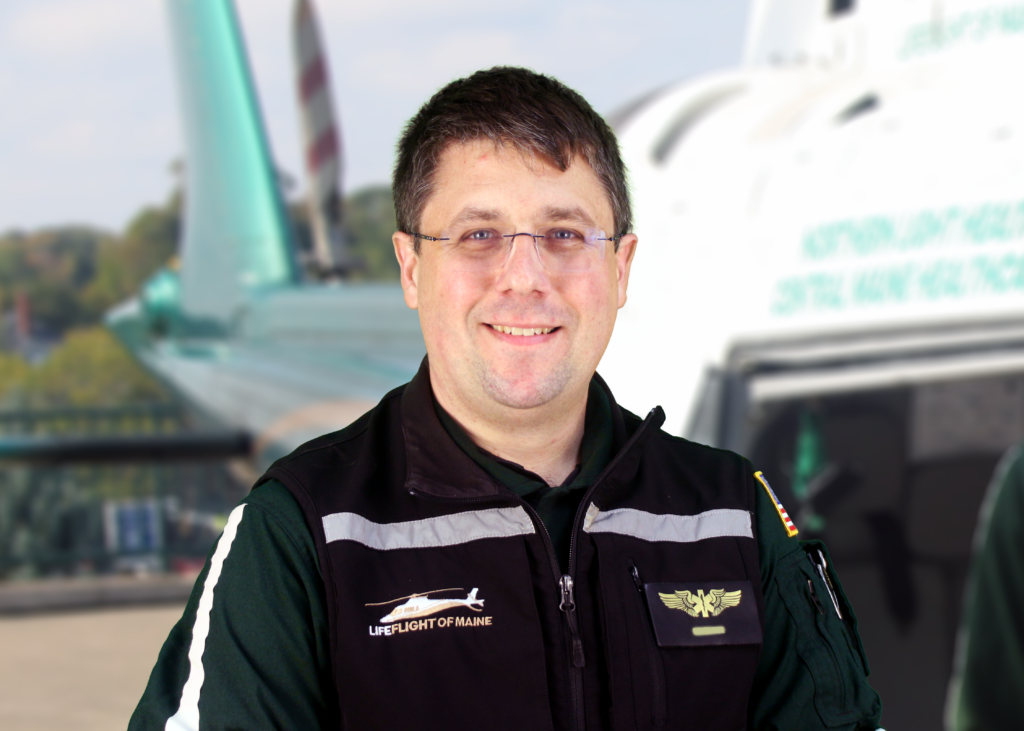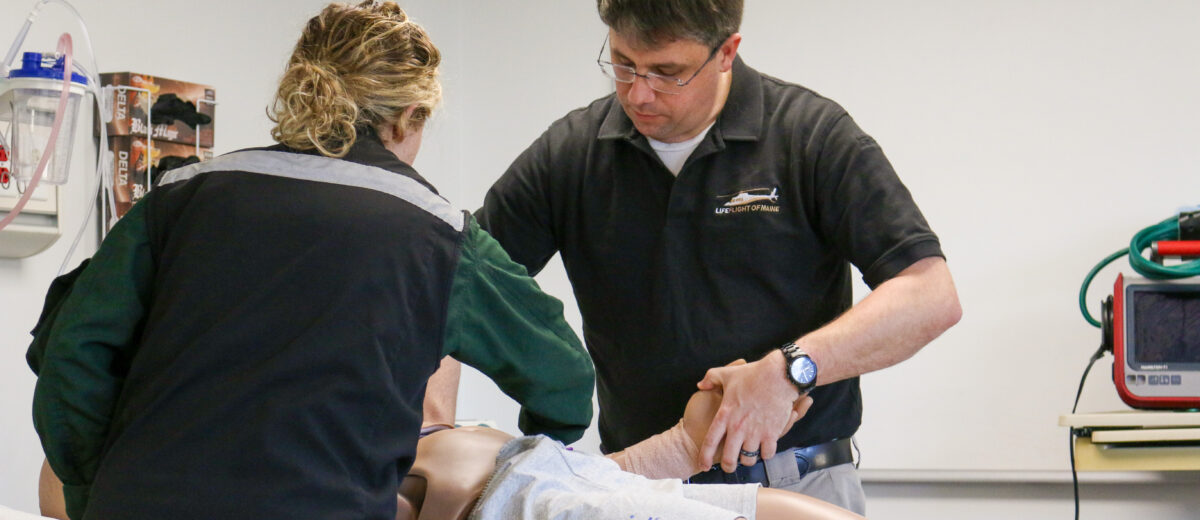Clinical Education at LifeFlight
LifeFlight of Maine recently promoted three of its medical crew members to the position of Clinical Educator. These more senior clinicians still regularly practice medicine on LifeFlight transports. They also now spend much of their time training newer crew members and sharing their expertise with EMS clinicians across Maine.
LifeFlight of Maine’s medical crew are among the best EMS clinicians in Maine. It’s how the system was designed. The most experienced, dedicated, and highly skilled clinicians cannot be everywhere all the time for the most acutely ill patients — unless, of course, they can fly.
LifeFlight’s role in Maine’s EMS system is threefold. First, it provides the swiftest critical care transport possible, moving acutely ill and injured people from smaller community hospitals to major medical centers. Secondly, it brings ICU-level medicine to the point of need by delivering elite clinicians aided by the most advanced equipment to the patient’s side. Thirdly, LifeFlight offers advanced clinical education both to its own medical team and to colleagues at EMS agencies around the state.
Nurses and paramedics come to LifeFlight with an array of experiences: some in trauma centers, emergency departments, or intensive care units; others in fire departments, EMS services, or the military. All have proven records of excellence as providers, and all receive further training from LifeFlight’s clinical education team when they are hired.
LifeFlight clinicians spend multiple months going through on-the-job training in orientation. This typically proceeds in four phases. The first involves mostly classroom instruction, simulation training, and observation shifts. By the final phase, the new clinician is treating patients in the aircraft under the supervision of a preceptor, who is a senior LifeFlight clinician.
During orientation, new medical crew members develop and are tested on the skills that fall within their expanded scope of practice as a LifeFlight clinician. These are what set LifeFlight clinicians apart. They gain advanced trauma skills. They learn to place arterial lines, which allow for more sophisticated patient monitoring. Skills such as these are typically only performed in a hospital, but LifeFlight can provide this care on an island or in a remote clearing deep in the woods.
Before clearing orientation, each new clinician must complete a minimum of six comprehensive high-fidelity simulations, which cover skills from basic to complex that could be required on a LifeFlight transport. These simulations are observed and reviewed by LifeFlight’s medical directors, along with the Chief Clinical Officer and Clinical Educators. They verify that the new crew member meets LifeFlight’s uncompromising standards for excellence before that clinician is cleared to care for patients. LifeFlight’s education team turns great clinicians into elite critical care providers.
LifeFlight also offers training to clinicians at hospitals and in EMS departments around the state. These programs play a critical role in improving the skills of providers across Maine’s EMS system. Having highly skilled clinicians who have trained to work together at every stage of the chain of survival — the continuum of care that stretches from the very first responder on scene or in an emergency room, through LifeFlight, to the team at a major medical center — improves outcomes for critically ill and injured patients.
Safely delivering the highest quality care to the people of Maine is LifeFlight’s top priority, bottom line, and operational objective. As a highly effective, mission-driven organization, LifeFlight is always challenging itself to improve. It’s baked into the culture. Clinical education is introduced to each medical crew member on their first day, and from there the learning never stops.
Meet our Clinical Educators

Tom Gutow
Flight Nurse and Senior Clinical Educator
Tom joined the LifeFlight of Maine team as a flight nurse with the Bangor-based crews in 2018. While in that role, he assisted with LifeFlight education programs before being promoted to Senior Clinical Educator in 2023. In this role, Tom oversees all of
LifeFlight’s education initiatives — training for new LifeFlight clinical crew members, ongoing education for veteran LifeFlight clinicians, and education for clinicians, EMS personnel, and first responders across Maine.
Tom trained as a nurse at the University of Maine at Orono. He held nursing positions in the emergency department at Blue Hill Memorial Hospital, in the intensive care unit (ICU), emergency department, and pediatric intensive care unit at Maine Coast Memorial Hospital, and in the ICU at Northern Light Eastern Maine Medical Center.
Tom grew up in Michigan, and graduated from high school in Nashville, Tennessee, before moving to Connecticut for college. He spent the first part of his career as a chef, training and working in restaurants in both the United States and France. He moved to Castine, Maine, in 1996, where he has lived ever since with his wife, Amy, who is the registrar at Maine Maritime Academy. Tom is also involved in the Fire and Rescue Department in Castine.

Barrett Strout
Flight Nurse and Clinical Educator
Barrett Strout joined LifeFlight of Maine as a flight nurse with the Lewiston-based crew in 2019. He worked fulltime as a flight nurse, while also helping to coordinate and teach programs at LifeFlight for hospitals and EMS agencies. In 2024, he took on the role of Clinical Educator at LifeFlight. He now splits his time between leading LifeFlight’s education programs and treating patients during shifts as a flight nurse.
Barrett grew up in Warren, Maine. He earned two degrees from the University of New England, one in biological sciences and a second in nursing, which he completed in 2013. He has served for 20 years in the U.S. Army, where he received additional medical training. After returning from a military deployment in 2014, Barrett worked as a nurse in the emergency department at Maine General Medical Center in Augusta. He gained additional experience as a nurse in the cardiothoracic intensive care unit (ICU) at Maine Medical Center in Portland before coming to LifeFlight.
Barrett currently lives in Augusta, and when he is not teaching or caring for patients, he spends his time golfing in the summers, skiing in the winters, or with his family at camp.

Patrick Underwood
Flight Paramedic and Clinical Educator
Patrick joined LifeFlight of Maine as a flight paramedic in 2016. With a background in EMS education, Patrick now splits his time between clinical shifts and leading LifeFlight’s education programs as a clinical educator, helping to train new crew members and leading workshops offered by LifeFlight to EMS providers statewide.
Patrick grew up in Presque Isle and Fryeburg. He became a licensed emergency medical technician (EMT) working with Fryeburg Rescue while still a high school student at Fryeburg Academy. After graduating, he worked in the emergency department at Memorial Hospital in North Conway, New Hampshire, while earning his paramedic degree from Southern Maine Community College (SMCC). After becoming licensed as a paramedic and a firefighter, Patrick worked for the Fire and Rescue Department in Gorham.
Patrick earned his instructor coordinator license from Maine EMS and a Bachelor of Science degree from the University of Southern Maine. He taught EMT classes at SMCC for several years. As his responsibilities grew, so did his love of teaching. He began teaching fulltime at SMCC as a simulation lab instructor, leading the effort to build the simulation lab, which is used across all the health sciences programs offered at SMCC.
Patrick lives in North Windham. When he is not on shift or in the classroom, he is spending time with his daughter or out on a lake ice fishing.
This story first appeared in our June 2024 issue of Dispatches.
It was updated on March 11, 2025.

